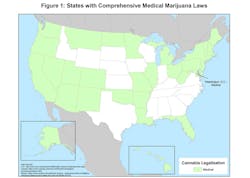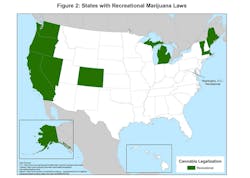Editor’s note: This the second part of a three-part series on legal marijuana’s emerging effects on trucking and transportation. Read the first part here.
Alcohol impairment is binary: You are either drunk or sober. But marijuana impairment might linger longer: You are still impaired even after intoxication. This is yet another hurdle for the trucking industry as it grapples with an evolving North America with more legal cannabis.
Adding to the complications of legal pot is the inability of science to accurately determine if a driver is currently under the influence with the same accuracy as alcohol detection.
Data on marijuana and its effects on U.S. roadways “is all over the place and you have people who manipulate that data to serve their own purposes,” Dr. Todd Simo, chief medical officer for HireRight, an employee background screening service, told a group of trucking executives and leaders during last week’s American Trucking Associations’ Management Conference & Exhibition in San Diego.
“The reality of the situation is impairing drugs are different in and of themselves,” Simo said, noting that alcohol impairment might be the most understood of all drugs. “You drink tonight, you’re impaired. When you sober up tomorrow morning, your blood-alcohol level is zero, you’re no longer impaired.”
“When you start looking at marijuana as a substance — and there are emerging studies out there in the occupational medicine world — that people when they go out and smoke pot, they’re intoxicated. And when they’re intoxicated, they’re high, they’re impaired, right? That impairment is an impairment where they know they’re impaired, therefore they compensate.”
“An alcoholic driver drives through the red lights, the intoxicated marijuana smoker stops at the green lights,” Simo said to a room full of laughter. “They are stopping there, wondering if they should go, right? Because they are so aware they are messed up. Well, the problem is that the studies are showing that the impairment of marijuana lasts longer than the intoxication window. So it’s different than alcohol.”
He added that the marijuana lobby has done a good job making the point that alcohol and marijuana are either the same or pot is better for you than alcohol. “Well from an occupational impairment perspective, marijuana is much worse than alcohol,” the doctor said.
As more states legalize both recreational and medical marijuana, professional truck drivers are more likely to be sharing the roadway with car drivers operating under the influence of marijuana. Without an accurate way to test for pot-impairment, the American Transportation Research Institute (ATRI) has been studying ways to deter these drivers from getting on the roads.
Twenty states have introduced legislation to legalize recreational marijuana, to join the first 11 states and the District of Columbia that are already there. This increase in legal recreational and medical marijuana is making it more difficult for trucks to find safe passage in the U.S, according to an ATRI study released earlier this year.
Tetrahydrocannabinol, the intoxicating agent in weed known as THC, is processed differently by the body than alcohol, “therefore different approaches are needed to identify and prosecute marijuana-impaired driving,” the ATRI report reads. Standard drug tests can show past marijuana use but it is not “generally indicative of intoxication.”
“As ATRI’s research identifies, a key tool for combating drugged drivers is deploying additional drug recognition experts,” said Mark Savage, Deputy Chief of the Colorado State Patrol. “A DRE can bring critical evidence to prosecutors that other tests simply cannot measure.”
The lingering effects of cannabis
Marijuana was an illegal substance across the U.S. for decades. But now 33 states have legalized medical marijuana and 10 states have legalized recreational pot, spurring a new industry. While the states have made these changes, the U.S. federal government still considers the production, sale, possession and use of marijuana to be a criminal activity.
While it may be legal to consume marijuana in various settings and scenarios, operating a vehicle on public roads while impaired is still a criminal offense. Issues associated with marijuana impairment, according to the ATRI study, are poor judgment, decreased motor coordination and decreased reaction time.
Citing some studies of marijuana smokers who are challenged to perform spacial-discriminating tasks 24 hours after using pot, they still struggle. “The people no longer feel intoxicated,” Simo said. “They feel fine.” But they struggle with challenges such as multiple object tracking, spacial determination and quick decision making.
“Well, what job did I just describe?” he asked the crowd. “It’s all three of those tasks right away: It’s all of your drivers out there. And it’s also all of your warehousemen that are out there. People working in distribution centers, manufacturing plants. So again, when we look at this, you really have to look at it from a safety perspective: what is right for the company, what is right for safety, what is right for the safety of the public, the individual and their coworkers.”
Paul Enos, CEO of the Nevada Trucking Association, noted there is a lot of tension between state and federal laws about marijuana. “Not so much with drivers, but it is for a lot of those other categories like somebody working in a warehouse, maybe a dispatcher.”
Enos is co-chairman of ATA’s newly formed Controlled Substances, Health & Wellness Working Group, which is tasked with tackling marijuana’s effect on trucking.
In Nevada, residents cannot be denied employment if they test positive for marijuana in pre-employment screening. But Enos said the NTA successfully pushed for that not to apply to drivers (it also doesn’t apply to first-responders and to other businesses that involve safety). The ATA last week officially took the same position as the NTA: “Maintaining that employer’s right to test if they believe that job can adversely impact safety,” Enos said.
More companies in other industries are not testing for drugs these days. “I know a lot of casinos in Nevada have stopped testing,” Enos said. “They stopped testing because they couldn’t find anyone who could pee clean anymore. So we have businesses that are making some of those determinations. But that’s one that we don’t have the luxury of because safety is paramount to everything that we do. And I think that if a company wants to have a zero-tolerance policy, a drug-free policy, they should be able to do that.”
As marijuana becomes legal in more jurisdictions across the U.S., there are going to be civil rights challenges to companies that want to still test and not employ medical- or recreational-cannabis users. Enos said there is one argument that wins out for trucking: “We as an industry need to be prepared when we have this conversation, to always bring it back to safety,” he said. “Always bring it back to the safety, especially, on our roads and highways. We cannot change the conversation from that because every other one, I think, is a loser for us.”
Different jobs, different rules
While it's obvious that drivers need to be tested, Simo said, it’s more complicated for other fleet employees.
“You have to craft a policy for your nonregulated workforce,” Simo said. “You can’t treat them like your regulated workforce, you have to craft a policy that says what we do with someone who makes the allegation of medical marijuana. Because of the states out there, there are 15 of them that have some sort of protection in place for medical marijuana users.”
“You have Nevada that has protections for the recreational user. Also, Maine has protections for the recreational user,” Simo added. “So as you go through that, you will have to look at your policy and say hey what do we do here? Because safety-sensitive employees may not just be drivers. They may be that person working on an assembly line, working at a distribution center, working on a forklift or doing something else.”
Simo said it’s important to think through how each position applies to safety because “marijuana is impairing in a different way. Do you want that person who no longer feels intoxicated not being able to spacially discriminate how far their forklift is away from someone? That could be a bad day for someone there.”
An example that Simo likes to use is an ammunition plant: Do you apply the same rules to the overhead crane operator at the plant as you do the receptionist? “So look at your policy and craft a policy that defines who’s safety-sensitive, who isn’t.”
“Just because a state says you have to consider accommodation, doesn’t mean that you have to accommodate. You just have to have a compelling business reason as to why you can’t accommodate,” Simo said, adding the regulations are somewhat similar to ADA laws. “Reasonable accommodation doesn’t mean you have to accommodate. You just have to reasonably accommodate.
Editor’s note: This the second part of a three-part series on legal marijuana’s emerging effects on trucking and transportation. Read the first part here.
About the Author
Josh Fisher
Editor-in-Chief
Editor-in-Chief Josh Fisher has been with FleetOwner since 2017. He covers everything from modern fleet management to operational efficiency, artificial intelligence, autonomous trucking, alternative fuels and powertrains, regulations, and emerging transportation technology. Based in Maryland, he writes the Lane Shift Ahead column about the changing North American transportation landscape.




